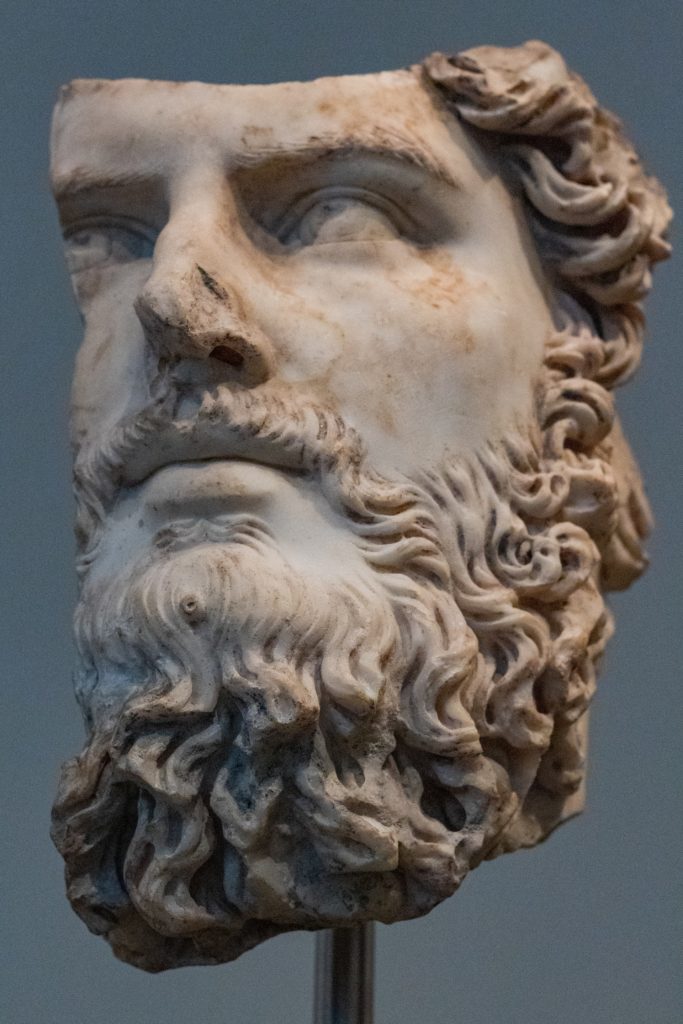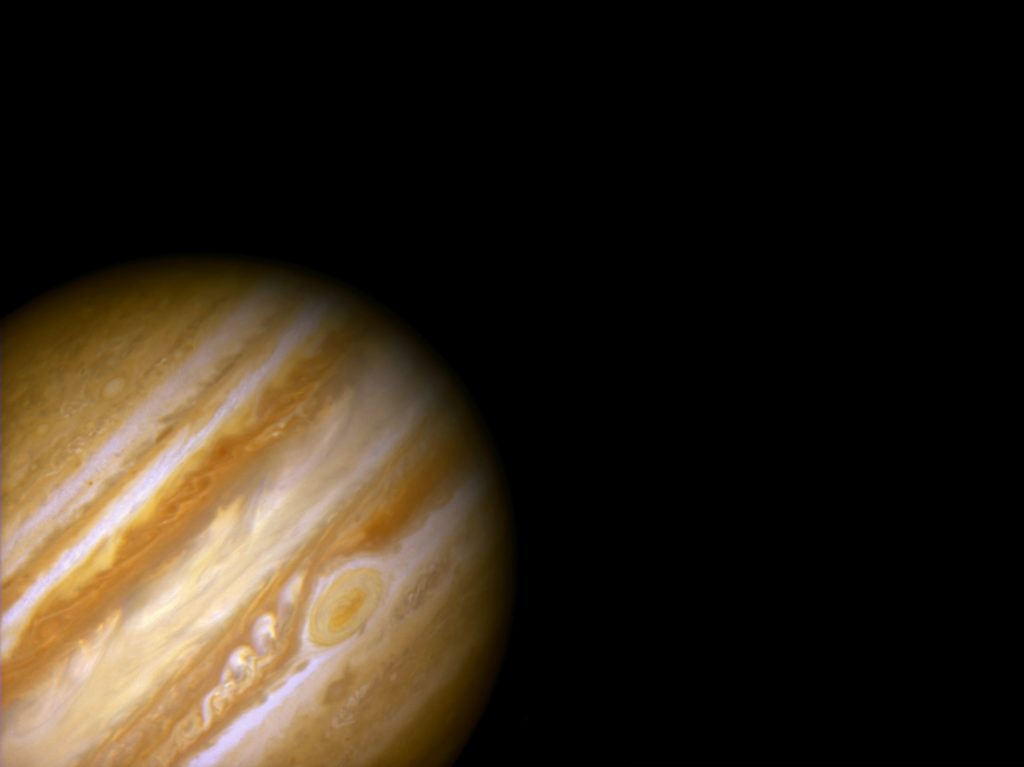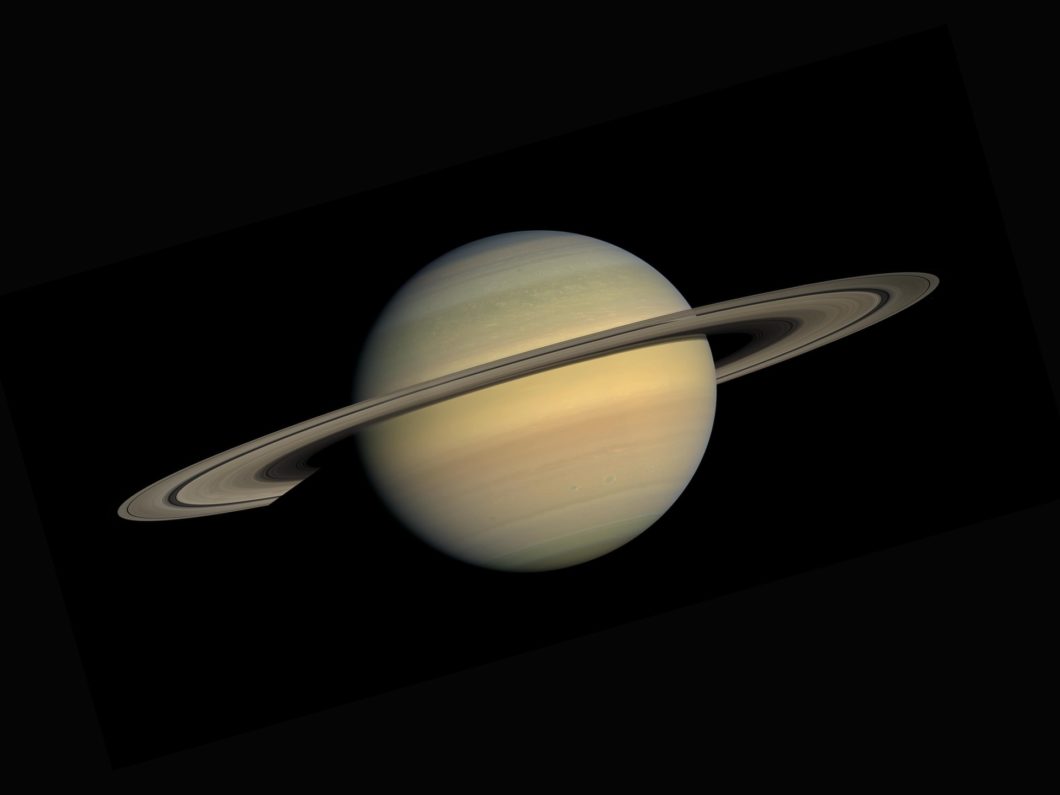The human perspective on reality has evolved and changed, and the values attributed to the two deities as well. When we go back in time to the period of the great goddess, we observe that she took many forms and presided over the mysteries of birth, fertility, and death.

Emergence of Zeus
During the second millennium before Christ, Zeus appears, a male god who claims male paternity and authority, and the recognition of the redeeming spirit, subjugating nature and exalting matter.
At first these invading gods subordinated themselves to the Goddess, and possibly shared power with her for a time, but eventually they took the place of honour. Zeus myths describe both this external historical development and internal psychological development.
The emergence of the dominant patriarchal principle that emerged in the Aries era.
In the new age, social organisation (represented by Zeus) began to emphasise blood ties (defended by Hera, her consort), the spiritual as opposed to the biological, a new type of moral law that challenged the old laws of nature.
The infallible way in which the offspring result from their various fortuitous unions demonstrates the overvaluation of the male contribution to fertility as the power of the goddess was stripped away. The partner was assumed by these myths to be always ready for fertilisation, the role of her monthly cycle now forgotten in its turn.
Quoting Sophocles in Trachiniae “to the normal Athenian of the classical period, Zeus was the meaning which more or less illuminated all great events. This insight brings us closer to the role of Jupiter in the birth chart, for as the lord of the ninth house it is precisely the search for meaning that this house occupies. This is the dimension of life that rescues us from the blind eternal circle of nature.
Zeus’ weapon is lightning, which he sends out when enraged. In Tibetan Buddhism, it is a symbol of irresistible spiritual power, the indestructible state of being that is beyond illusion and corruptibility.
Homer describes him as “Zeus unconquerable, who toppled the tall towers of many cities and will still destroy others.” He can illuminate or destroy, and points to Zeus who works as an illuminator, all the while reminding him that he is a powerful figure, and the planet Jupiter is not as harmless as it was considered for some time.
The Story of Zeus
Zeus is the son of Kronos (Saturn) and Rhea.
Cronos being perhaps a god still subservient to the goddess.
Because of a prophecy that Kronos would be forced to abandon his throne as king of the gods to one of his children, he puts it into practice to devour them at birth.
With the help of Ouranos and Gaia, Kronos’ parents, who he in turn overthrows, Rhea gives birth to Zeus in Crete and takes him there, offering Kronos a stone to swallow in her son’s place. In due course, Zeus enlists the help of his first wife Metis Wisdom, Good Advice), daughter of Oceanus and Tethys, who advises him to visit Rhea and ask for a potion. Rhea elaborates the potion that he mixes with his father’s drink and the old god regurgitates Zeus’ brothers: Hestia, Demeter, Hera, Hades and Poseidon, who under Zeus’ leadership wage war against the Titans.
As is always the case with myths, there are different accounts of how Zeus deals with Kronos when he fulfils the prophecy. Some say he threw Kronos into the depths of Tartarus, but in another version, he would have banished him to a dignified exile to the islands of the blessed in the western ocean.
In all the stories of successes that followed, he was always helped through alliances. All these stories of assistance tell us that Zeus’s authority is achieved and maintained only by allegiance, albeit one-sided, with the deities of an earlier period, more biologically oriented, ultimately with the generous earth goddess. All these stories of assistance tell us that Zeus’s authority is achieved and maintained only by allegiance, albeit one-sided, with the deities of an earlier period, more biologically oriented, ultimately with the generous earth goddess. An analysis that may be useful, after learning from their stories, is that Jupiter, although powerful, has limitations and needs to be “grounded” and nurtured by the feminine principle and her exaltation in cancer seems to reinforce this idea.
On the mythological journey, for Zeus persecution is everything and long-term commitment is tiring. But Hera’s marriage endures – the jealous wife’s hostility apparently provides Zeus with some kind of necessary foundation/grounding, a restraint that whets his appetite for an endless string of brief affairs with goddesses, nymphs, and mortals. Thus, the free-roaming Jupterian always exists in context and in contrast to a more established and restricted way of life.

Jupiter in Astrology
The mythological figure of Zeus thus embodies a number of features that are highly relevant to Jupiter’s role in astrology. It is associated with the concept of the divine in general.With brightness, illumination and meaning, with the masculine as opposed to the feminine, but it seems to require some support from the latter to reach its goals. He is a powerful authority figure who rages and punishes when he is angry, and he is also a fickle seducer and rapist. He sows his seed everywhere.
Although in astrology the description of the Jupiter/Saturn relationship is one of opposition and difficulty, both operate at the same time, are complementary and one requires the other. What goes up must come down; systole follows diastole, and sowing is followed by reaping. These two planets are between the personal planet group and the transcendent planet group. They mediate the polarities that can be understood as hope and fear, abundance and scarcity, expansion and contraction.
Jupiter is what encourages us to expand, promising that everything we need is within our reach. He fills us with the feeling of limitless potential, whispering that anything is possible, inspiring and stimulating, leading us and convincing us against all the evidence. He excuses us. It throws us beyond. But he also warns: “know your limits”.
He fills us with the feeling of limitless potential, whispering that anything is possible, inspiring and stimulating, leading us and convincing us against all the evidence. He excuses us. It throws us beyond. But he also warns: “know your limits”.

Saturn in Astrology
Saturnine fear, on the other hand, makes us feel disdain, knocks us down, shrugs our shoulders and bows our heads; it raises cynical doubts, mutters caution, reproaches and inhibits feelings of inadequacy and painful self-awareness. His advice is usually to take it with caution and safety and hold on to what we have.
He is deeply suspicious and the Jupiterian penchant for taking risks. And yet, he owns the 10th house, the highest point on the map, where we place our need for fulfilment, recognition, and appreciation.
Saturnian security is the prison for Jupiter. The limitations imposed by Saturn are those of the concrete world. Form implies definition, limits. Saturn confines us to the real world as experienced by the senses and all our inspirations must ultimately pass the reality test. But there is an inner instance behind every Saturnian structure, there is a glimpse of the possibilities, for nothing can become without the realisation of its potential. Every successful business at first was conceived in the imagination, as a possibility.
Jupiter and Saturn
With Jupiter in Capricorn now, we have to be aware that Jupiter can deceive, using all sorts of disguises, but he points the way forward and in his alliance with Saturn in Capricorn, there will be ways to consolidate understanding and we can walk towards the fulfilment of our projects. It is time to foresee possible developments regarding the optimization of the use of material goods and the organisation of time and movement.
Jupiter laying down the laws and hurling lightning may be as tyrannical as Saturn, but each has very different motivations. Jupiter laying down the laws and hurling lightning may be as tyrannical as Saturn, but each has very different motivations. Important decisions cannot be attributed to inexperienced adventurers. Things cannot get out of hand. The Jupiterian dictator, on the other hand, simply feels what is right and his word cannot be disputed even though it may represent the whim of the moment.
Another area that Jupiter and Saturn touch upon is the issue of time. Saturn, the lord of time, but his domain has a limiting aspect. The restrictions of the present moment, largely and/or totally defined by the actions of the past (karma), and the awareness that our days are numbered. It is the old man looking back and wary of innovations. Jupiter is associated with the gift of prophecy, which Zeus acquired by devouring Metis and his mastery of possibilities where the future lies. As a middle-aged conductor, he is also an experienced man who is concerned with the totality of experience.
As rulers of time, Jupiter and Saturn, through their regular recurring conjunctions in the pattern of triplicities, formed the measure of history long before the discovery of the outer planets. The 12-year Jupiterian cycle is comparable to the solar measurement of the 12 months of the year while the 21-year Saturn cycle (2 and a half years per sign) is related to the lunar cycle of two and a half days per sign. This conjunction/alignment that will occur in 2020 will balance the feminine and masculine aspects of these planets. Therefore, the restriction and form provided by Capricorn/Saturn is necessary to counteract the wild Jupiterian enthusiasm and thus create excellent opportunities for achievement.
Topics that Jupiter brings up on his journey: Travel, faith, vision, politics, crime, extremism, laws, theories, luck.
Jupiter and Saturn initiate a new synodic cycle through a conjunction first on December 3, 2020 at 28th Capricorn and again on December 19 at 0th Aquarius. We continue in another article. Want to know how these planets and their cycles will affect your map? Make your progression with me. Debbie Worthington whats: 11 97507 7988.
Bibliography:
- James Hillman – The dream and the underworld
- Robert Graves – Greek Mythology
- C. Kerenyi – Zeus and Hera
- Joseph Campbell – The Masks of God.
- Homer – Iliad
- Robert Graves – The White Goddess.
- Alan Leo – How to judge a nativity
- Eve Jackson – Jupiter



